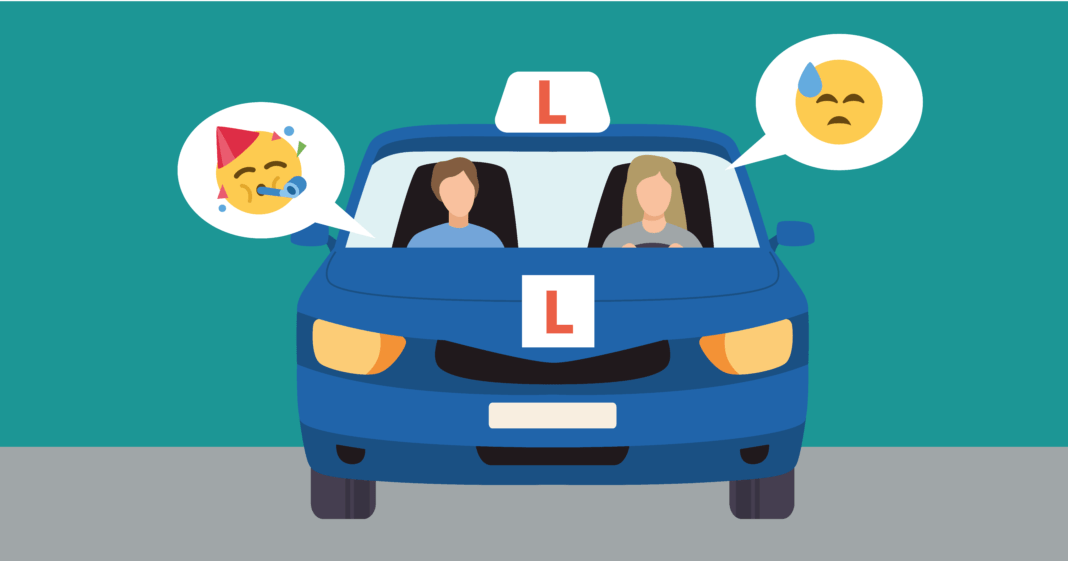Last Updated on July 18, 2023
As a driving instructor you may find that new learner drivers are experiencing driving anxiety. This may affect their ability to learn to drive effectively. In the UK 16–29-year-olds are 28% likely to have some form of anxiety (Mental Health Foundation, 2021). This is the prime age for learning to drive and could make driving a scary experience! This can come from fear of the unknown, lack of confidence or general anxiety. Driving instructors are not mental health professionals. However, there are ways that you can make your anxious learner driver feel more comfortable when they are learning to drive.
We are going to give you some tips on how to make anxious learner drivers feel comfortable when learning to drive. Along with how to build up their driving confidence. It is good to remember that people learn in different ways. One approach may work well for one person but not another.
By listening to your pupils and supporting them effectively, you can create a positive environment, making them feel more at ease and less anxious. Being able to support your students may make them more likely to stay with you as an instructor, rather than looking elsewhere for someone who can support their needs better.
Contents
Create a welcoming environment
Provide support to an anxious learner driver
Help learner drivers to feel prepared for driving test
Create a welcoming environment
When a learner driver is coming to you for their first lesson, it is a very unfamiliar situation with an unfamiliar person, for anyone this could cause anxiety. It may be hard as the learner driver doesn’t know what to expect on their first lesson. Make the process as simple as possible for your new student when they are first starting their lessons.
When you are picking up the learner driver try to be close to where they have requested pick up, or in a place where they can see you clearly. Make sure that your car is clean and welcoming for new people to make them feel comfortable.
Also do not jump straight into the teaching! Introduce yourself and get to know a little about the learner before getting into the lesson. This can make the learner driver feel more at ease and less anxious, being in a comfortable environment rather than just feeling like they are in a car with a stranger!
It may also be helpful to outline what you will be doing on the first lesson and how it will work. Along with a debrief at the end of the driving lesson. This takes away the unknown and can help drivers with anxiety feel more at ease.
Communication is key!
Getting to know your students and what works best for them can be useful. You can find out what sort of learning style they have and how comfortable they are with trying new things. You may find some people learn better taking things slow and building up confidence, others will learn better by just going for it! By understanding how your student learns it can help them to feel less anxious during lessons as they feel understood.
As a driving instructor you should be communicating at all parts of their learning journey.
At each stage you should be letting your pupil know what is going well, what they need to work on. Remember to always be constructive. If you do not let a learner know what their strengths and weaknesses are, it can make it harder for them to improve. This is especially true if your student is having private practice, as they will know what areas to work on.
In some instances, during driving lessons there may be times when as a driving instructor you need to use dual controls or take the wheel to make things safe for the learner driver. As a learner driver this can feel as if you are not doing a good job driving. This can knock a learner’s confidence and cause anxiety. Make sure you always explain why you used the controls and check to make sure the driver is okay to continue if they get anxious.
Provide support to an anxious learner driver
When learning to drive there are so many new things to figure out! From lesson to lesson you may find a student getting stuck on things they know how to do, or struggling with something you know they are capable of. Make sure you are offering useful guidance and help. Remind the learner driver of what to do and how to improve in a calm way.
Alternatively, if a learner driver is doing amazing, let them know! It can be a huge confidence boost to feel like a driving instructor is impressed. Celebrating success also reinforces that the learner is capable. So, make sure you celebrate your students on little and big wins!
If you feel like your learner could do with extra practice let them know about learner driver insurance options available to them. Sometimes it’s imperative that they get more practice outside of lessons on their learning to drive journey.

Don’t get frustrated
It can be easy to get frustrated if you have a learner that is struggling, especially when you know they are capable of driving. However, raising your voice, sounding annoyed/frustrated or being blunt can create a hostile environment. This could make it even harder for the anxious learner driver to concentrate and raise anxiety levels even further.
If you feel as though a learner is getting too panicked, overwhelmed, or struggling to concentrate, take a step back. Try and go back to something they feel more comfortable with. This can help reduce anxiety levels by doing something they are familiar with and increase their feelings of confidence.
There even may be times where a lesson will need stopped early because of anxious feelings. Give the learner a safe space to express when they are feeling overwhelmed and communicate about what the best course of action will be. This could be a pause to recover, changing to something simple or ending the lesson early.
Don’t make a big deal if a learner is feeling like this and just give them the space they need and keep the pressure off.
Give your student time
Some learners will take longer to feel confident and prepared for their driving test. Especially if they experience anxiety! Try not to compare your pupils to one another and push them to apply for their driving test quicker. They want to take more time to feel fully confident when driving.
Some learners want to feel very confident driving independently and know how to do everything before taking their test. Just take the time to teach them and go at their pace. You can advise when you think they are ready to take their driving test but, do not push them into it if they are not in the right frame of mind.
Help learner drivers to feel prepared for driving test
When going in for a driving test a learner driver may experience driving test anxiety. This can be because they do not know what to expect or feel pressure trying to pass first time. Make sure you are preparing them for the structure of the test. Letting them know the questions that come up and what they should know before the test.
Mock tests can allow learners to understand how the test will work and could also build their confidence. You may also notice common mistakes that they make, so you can go over this more in lessons. This will put them in a better position going into their test. Taking the time to teach test routes and prepare for the driving test can help to ease a learner drivers anxiety level.
When they are ready for their driving test, your student may be very comfortable driving with you but the thought of driving with a different person could be scary. You could suggest letting family/friends sit in on lessons to get used to driving with other people in the car. They could even go for private practice, so they get used to someone else sitting with them up front when driving.









